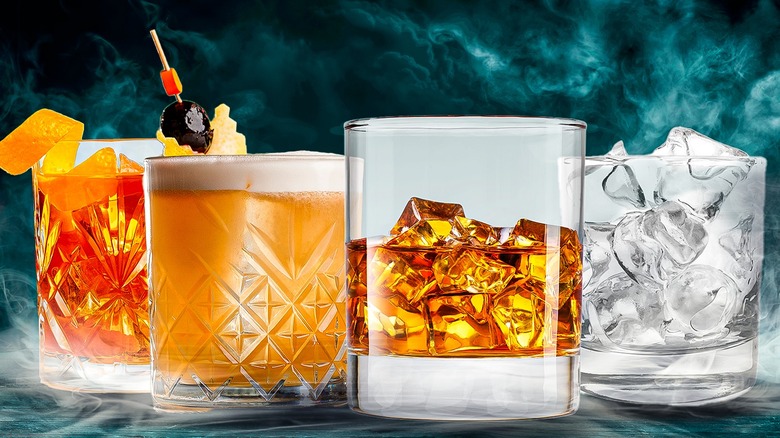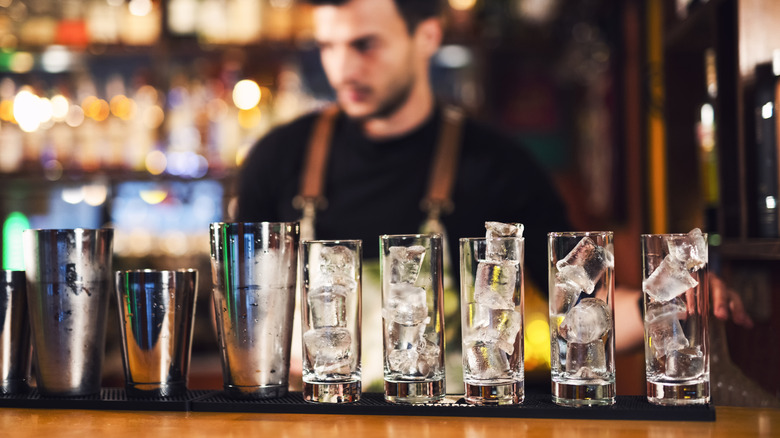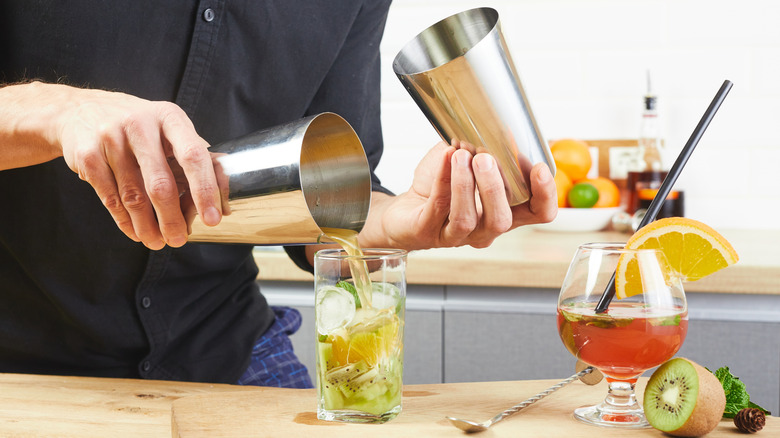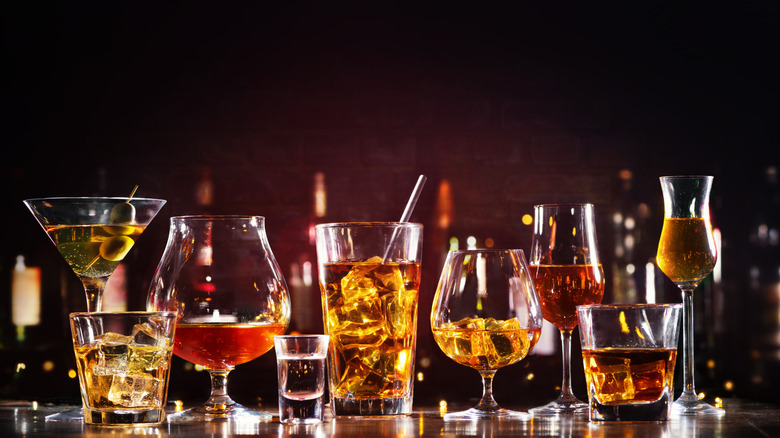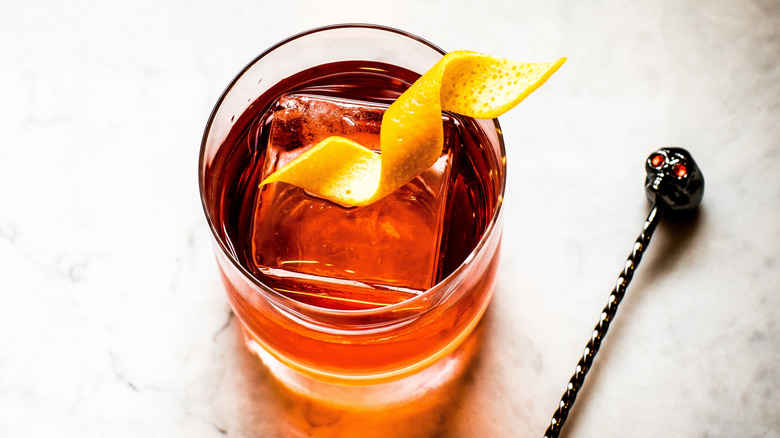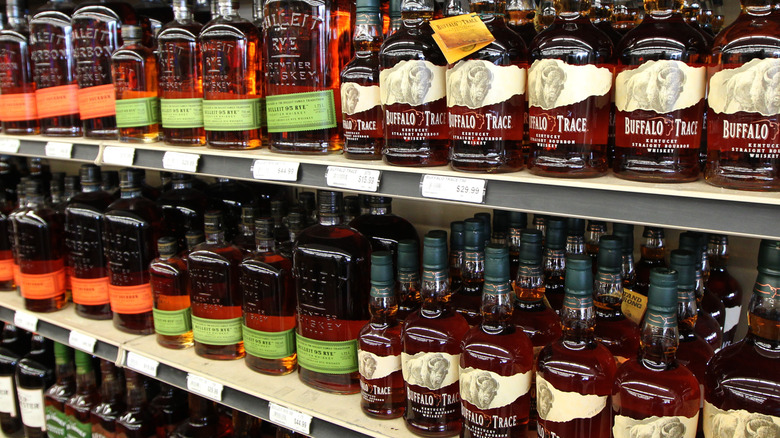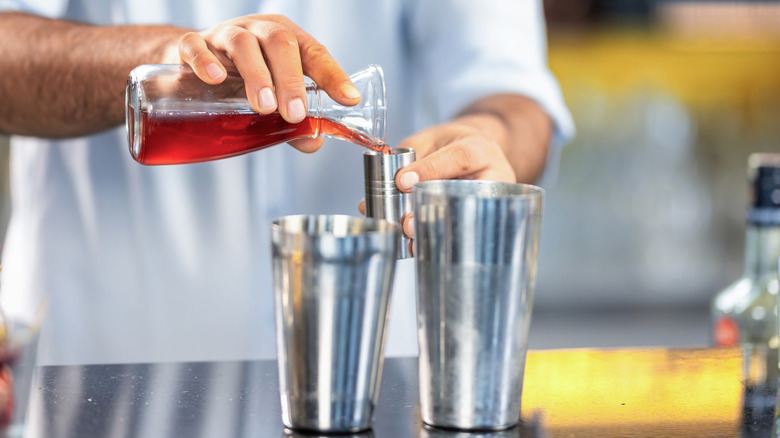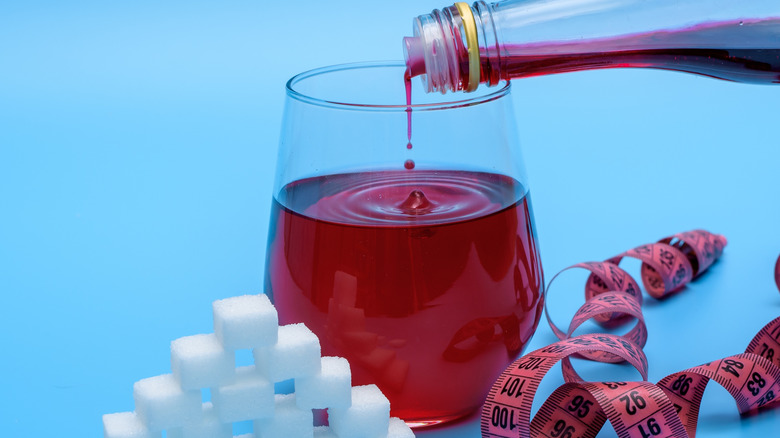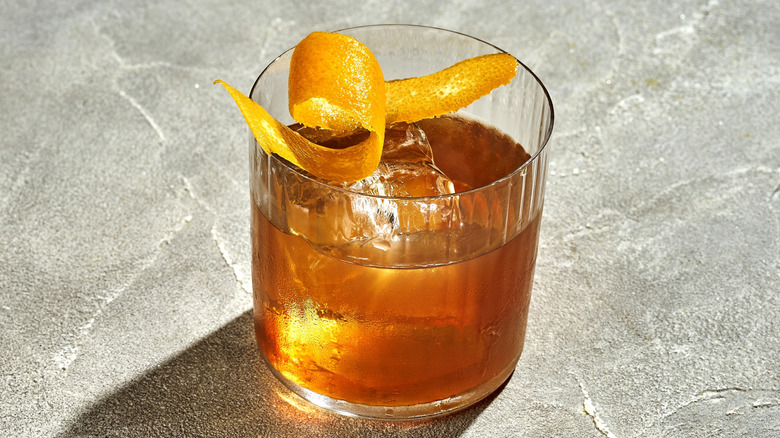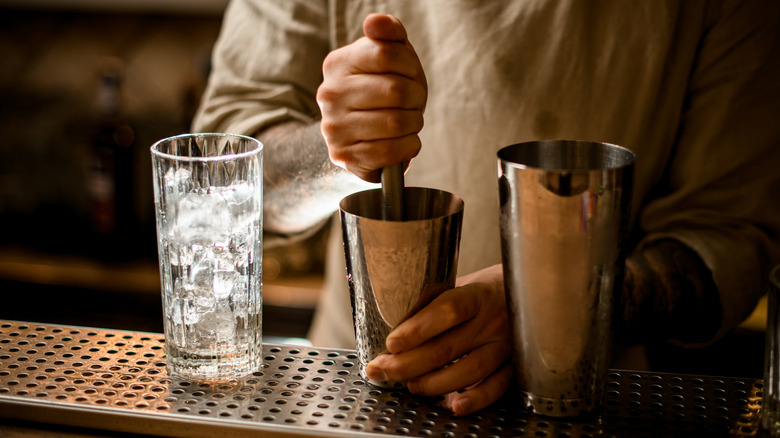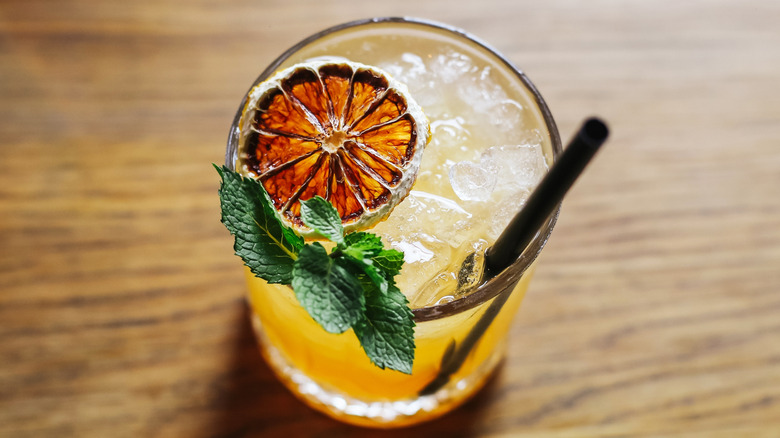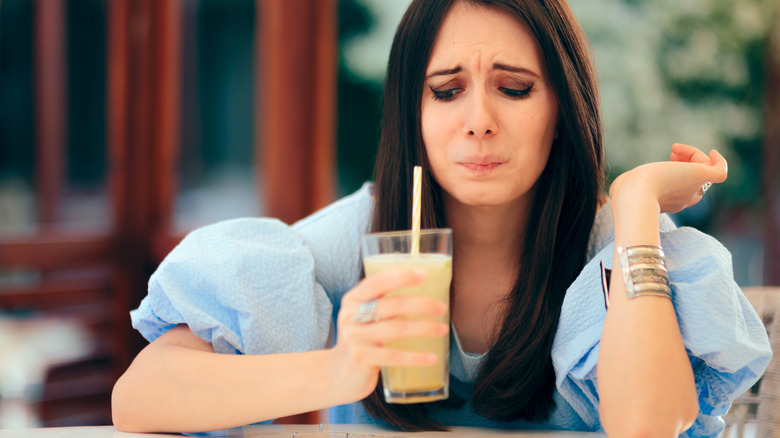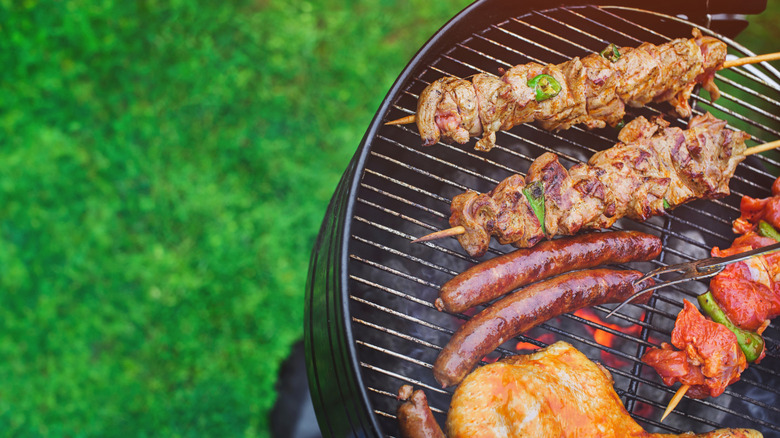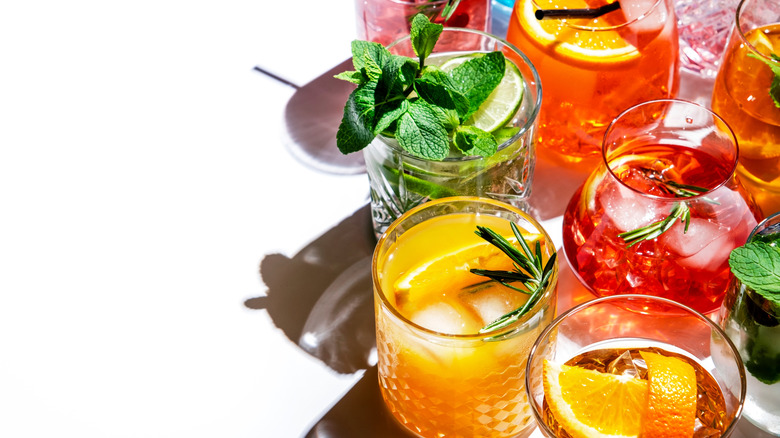14 Common Mistakes To Avoid When Crafting Whiskey Cocktails
Crafting a whiskey cocktail is fairly simple, or at least it can be if you know what you are doing. If not, things can get surprisingly complicated — and quickly, too. Some recipes are obviously more involved than others and will require additional know-how to execute, but the extra effort typically pays off in the end regarding flavor, complexity, and overall deliciousness. Regardless of the particular cocktail you want to create, there are quite a few amateur mistakes that seriously affect the final outcome. Avoiding these common mishaps is super easy once you know what they are.
To uncover some of the most common and unfortunate whiskey cocktail mistakes people fall prey to, I checked in with a couple of experts from The Cask Connoisseur: Chris Walster and Luke Slater. Walster is a Whisky Connoisseur with over 30 years of experience exploring the spirit, and Slater is a Beer and Whisky Connoisseur, who works in hospitality as well. Their combined knowledge helped me come up with the following 14 common mistakes to avoid when crafting whiskey cocktails. I also added a few tips and insights that I picked up working in bars and restaurants for 20 years.
Whether you are a new bartender, want to brush up on your amateur home mixology skills, or fancy yourself somewhere in between, taking a few notes from our experts will surely help you in your pursuit to make perfect whiskey cocktails.
Adding ice to the mix too soon
Many amateur bartenders think the first step to making a cocktail is adding ice to the glass. However, this isn't always the case. Our whiskey experts from The Cask Connoisseur, Chris Walster and Luke Slater, told me, "If the drink is going to be served and drank immediately, then ice first is perfectly acceptable." Really, it isn't a huge mistake. However, if the drink is going to sit for a minute or two or there is any kind of delay in enjoyment, circumstances change. When this is the case, Slater says, "The ice should be added as late as possible to avoid over dilution." After all, no one wants a watered-down drink — unless, of course, it is a whiskey and water.
"Cocktails made from whiskey typically call for stirring the ingredients which might be harder if ice has been added," Slater said. To ensure a perfect mix and minimal dilution, it is often best to only include ice once the ingredients are combined and stirred. Then, adding the ice is not only simple, but it won't get in the way of building your cocktail.
Not knowing when to stir and when to shake a whiskey cocktail
You may think it doesn't make much of a difference whether you stir or shake a cocktail, but minor details like this actually affect the final outcome of your whiskey cocktails quite a bit. When you shake ingredients with ice, it dilutes the mix with water. The more you shake, the more diluted your drink becomes. While shaking is great for some cocktails, like martinis because they are served up, it isn't always the best course of action for other drinks.
Our experts from The Cask Connoisseur, Chris Walster and Luke Slater, told me that the ingredients in a particular cocktail determine whether shaking or stirring is best. According to the pair, you should stir spirit-forward cocktails, like an Old Fashioned or a Manhattan. Drinks that contain juice or egg whites, like a Whiskey Sour or Bourbon Smash, should be shaken. In addition, I've also found that most cocktails with citrus juice in them need to be shaken. When you are building your whiskey cocktail, whatever it may be, consider the ingredients and follow these rules of thumb. They'll ensure you don't accidentally sidestep perfection by shaking a cocktail that needs to be stirred, or vice versa.
Overpowering whiskey with too many ingredients or an excess of heavy mixers
Whiskey is layered with nuanced flavors, and you want its complexity to shine through, even when you turn it into a cocktail. With this in mind, overpowering whiskey with heavy mixers or a multitude of ingredients is typically not recommended. Whisky Connoisseur Chris Walster tries to steer clear of using heavy mixers that can potentially overpower the spirit's natural flavors. Even so, how you craft a cocktail depends a lot on your personal preferences.
Whether you prefer a more whiskey-forward drink with minimal ingredients added or a cocktail with mixers, balance is key. As Walster told me, too much mixer takes away from the whiskey's flavor. Too little, and you run the risk of overpowering people who dislike drinking whiskey neat. So yeah, it's all about matching your proportions to your palate. Walster recommends adding mixers slowly and tasting along the way if you aren't sure what you like just yet. It's easy to add a little more until you get it right, but taking away isn't so simple.
Using the wrong type of glass for your whiskey cocktail
The type of glass you use to make any kind of drink matters, whether it is a whiskey cocktail or not. Our experts at The Cask Connoisseur, Luke Slater and Chris Walster, couldn't agree more. They even said the glass you use can affect the spirit's flavor, but this is only when you are drinking it neat (a.k.a., straight out of the bottle). When making whiskey cocktails, the ingredients you use will guide the flavor, but choosing the right glass is still important. Doing so not only improves presentation, but it enhances aroma and elevates the overall experience. You want to draw all of your senses in, and the eyes and nose are a fantastic place to start. After that, the correct balance of flavors seals the deal.
There are many different kinds of cocktail glasses, and they all serve varying purposes. When crafting whiskey cocktails, there are two main glass styles to keep on hand: highball and rocks. Highball glasses are perfect for whiskey cocktails featuring a mixer like juice or soda. Rocks glasses are what you need to make booze-forward whiskey drinks, like an Old Fashioned or Sazerac. Copper mugs are also fun to keep around if you are a fan of whiskey mules, but a highball glass works just as well.
Underestimating how much the shape of your ice affects a whiskey cocktail
If you've ever been to a bar and seen them serving drinks with one large ice cube, it's easy to think it all boils down to fancy presentation. While they do add something to the overall drink's appeal, they also serve a purpose. Large ice cubes don't melt as quickly as their smaller counterparts. As a result, they won't dilute a perfectly mixed cocktail nearly as fast. This principle spans beyond a curated ice sphere or large square chunk too. So, thinking the type of ice you use in a whiskey cocktail doesn't matter would be a mistake.
Chris Walster and Luke Slater from The Cask Connoisseur recommend using larger ice cubes or chilled whiskey stones for whiskey cocktails. They also said crushed ice should be avoided because it can easily over-dilute your drinks. If you want to take your whiskey cocktails to the next level, it may be best to pick up a special ice tray designed to make large whiskey cubes. Whiskey stones are fun too, especially if you want to ensure your drinks don't get diluted at all, but Slater and Walster warn that they won't chill your drinks quite as well as ice.
Thinking the type of whiskey you use doesn't matter -- or using a pricey bottle
When crafting cocktails, you might think it doesn't matter what kind of whiskey you use since you'll be adding other flavors with mixers and more, but this couldn't be further from the truth. You always want to start your cocktails off with a solid base, i.e. the right type or grade of whiskey. For example, rye whiskey tends to be much spicier and this flavor can seriously alter a drink's flavor.
At The Cask Connoisseur, they don't see anything wrong with choosing house spirits. However, they also note that cheap isn't always the best bet: "If you want to elevate your experience, often using a mid-range bottle is the best one to go with. But if you just want to try it out, go with your budget!" Chris Walster also stressed that you don't necessarily need to use your most expensive spirit, as it's not being enjoyed for its own flavor. Instead, choose a middle-of-the-road bottle and your cocktails will shine without the need to spend a ton of cash.
Not paying attention to the measurements in a whiskey cocktail recipe
To the uninformed observer, it might look like speedy bartenders are simply throwing ingredients into cocktail glasses without much precision to create a great drink. This isn't true, though. Their expertise comes with experience and — you guessed it — precision. When crafting a new cocktail, it is more than okay to eye ingredients and play around, but if you are making a specific recipe, measuring ingredients makes a world of difference. The perfect cocktail has a balance of flavors, and veering away from the measurements won't serve you well. In fact, some drinks may end up tasting pretty bad.
Whisky and Beer Connoisseur Luke Slater always uses a jigger to ensure he gets his measurements just right when he's at work. When at home, he is a little more free with approximations — as long as the cocktail still tastes good, he won't complain. However, he has tons of experience perfecting his cocktail recipes. If you are a new home bartender, you might want to stick with a jigger until you have a good grasp of how a cocktail's ingredients come together.
Making whiskey cocktails with too much sugar
Adding sugar to a whiskey cocktail helps it achieve balance, but use too much and regret starts to seep in. As our experts from The Cask Connoisseur, Chirs Walster and Luke Slater, told me, "Excessive sweetness can dull the rich, caramel, and spice notes of bourbon, resulting in a cloying drink rather than a well-rounded one." While sugar compliments the natural spices of bourbon and whiskey, it's easy to go overboard — don't make this common mistake.
According to Slater and Walster, "It's important to find the right balance of sweetness, whether from syrups, juices, or liqueurs, to complement the bourbon without overpowering it." They recommend using fresh, high-quality ingredients to help you achieve the proper balance of flavors — no cheap liqueurs or canned juices for them. They also noted that, when adding mixers, moderation is best. You don't want mixers to mask whiskey's inherent flavors. Instead, a well-crafted cocktail gives whiskey the room it needs to shine. This is where recipes are a big help. They eliminate the guesswork and ensure you don't add too much sugar or any other overpowering ingredients.
Forgetting to pair whiskey with bitters and citrus
Whiskey is a long-time friend of citrus and bitters. That's why you'll find whiskey paired with one or maybe even both in an array of classic cocktails. Everything from an Old Fashioned to a Whiskey Sour to a Whiskey Mule has at least one of whiskey's best friends added to the mix — and an Old Fashioned has both.
So, what makes bitters and citrus pair so well with whiskey? Luke Slater and Chris Walster of The Cask Connoisseur shed some light on the matter. They told me bitters adds depth to whiskey cocktails, as is evident by the layered, downright delicious flavor you find in an Old Fashioned. Citrus, on the other hand, adds brightness and freshness. That doesn't mean it's a free-for-all when it comes to adding bitters or citrus to whiskey cocktails, though. According to the experts, "You need to make sure that the bourbon flavor profiles fit with the ingredients suggested. For example, if it's a high rye bourbon you might not want to add any extra spice to it, but if it's got citrusy notes then extra citrus might enhance it." In the end, it all comes down to the specific bottle.
Choosing not to muddle whiskey cocktails containing fruits or herbs
As a general rule of thumb, any fruits, herbs, or other kinds of plant material that go into a cocktail should be muddled. In fact, it's a key step in releasing the aromatic flavor of these types of ingredients. Choosing to skip this crucial step is a common mistake — don't let it be one you make.
As our experts from The Cask Connoisseur pointed out, there aren't many whiskey cocktails that require muddling. For the most part, stirring or shaking is all that's needed to properly mix flavors. However, there are a few classic whiskey cocktails that do call for muddling, like an Old Fashioned (at least the newer variation with a muddled cherry and orange slice does). A Whiskey Smash, which contains lemon and mint, also falls into this category. If you don't have a muddler, look for something you can use as a substitute. Often, the wide end of a large spoon or spatula will suffice in a pinch. It won't work as well as an actual muddling tool, but swapping out the utensil is much better than forgoing the step entirely.
Assuming garnishes don't add anything to the drinking experience
Once you craft a delicious whiskey cocktail, the final step is adding a garnish. You may think it isn't really necessary, and all things considered, it isn't. Still, it adds a final flourish that catches the eye. Luke Slater and Chris Walster from The Cask Connoisseur agree garnishes are not strictly necessary. Even so, they told me that it can help enhance the drinking experience.
According to our experts, not only do garnishes add visual appeal, but they bring out all of the flavors of the drink. Can you skip garnishes and still enjoy your cocktail? Sure, but they add to both the aroma and presentation, making them a fantastic way to enhance the overall sensory experience. If you are making drinks for friends, garnishes certainly put a professional spin on things, too. In the end, it all comes down to your personal preference, but if you want to attain pro whiskey cocktail making status, garnishing your drinks will certainly help push you in the right direction.
Leaving out ingredients in a whiskey cocktail recipe
Leaving ingredients out of a specific whiskey cocktail recipe or substituting them freely is another common mistake many amateur bartenders fall prey to. It may seem harmless to simply omit an ingredient because you don't have it on hand, but it won't taste nearly as good if you do. After all, the ideal whiskey cocktail relies on a balance of flavors. Leaving a seemingly small ingredient, like bitters, citrus, or sugar out drastically affects the final outcome, and typically not in a good way.
According to Whisky and Beer Connoisseur Luke Slater, "It's always best to stick to the recipe, otherwise it's not the whiskey cocktail." He noted that you may find recipes with slight variations, but simply adding a slew of random ingredients to a glass won't leave you with a drool-worthy cocktail. You might get lucky, but recipes have already been perfected and you can count on them to help you build something wonderful every time.
Not pairing whiskey cocktails with complimentary foods
Another fantastic way to enhance your whiskey cocktails doesn't have to do with the actual crafting of the drink. Instead, it involves pairing your tasty creations with complementary foods. Fortunately, there is a wide variety of dishes that enhance whiskey by bringing out its rich, sweet, and often smoky flavors.
According to The Cask Connoisseur's Chris Walster and Luke Slater, "Aged cheeses like sharp cheddar and Gouda, along with charcuterie such as prosciutto or bacon, balance whiskey's complexity." If you're looking to enhance the spirit's smokey notes, they recommend grilled meats, particularly steak and ribs. Roasted nuts like almonds and pecans can also be used to bring out whiskey's toasty undertones. To accentuate its warmth, opt for spicy foods like BBQ and chicken wings. Lastly, they told me dark chocolate and whiskey is a classic pairing that goes perfectly with a bourbon Old Fashioned.
This all sounds delicious, and it is! Don't make the mistake of thinking whiskey is meant to be enjoyed solo. Pair it with a complimentary dish and you'll be amazed at how the flavors compound and expand in your mouth.
Not branching out from a basic whiskey highball
A basic whiskey highball is built with a shot of whiskey and a mixer, like ginger ale, Coke, or maybe even water. While these simple, classic cocktails have their place, not branching out from them on occasion is a big mistake. The world of mixology has a whole lot more to offer than a simple two-ingredient mixed drink and you don't want to miss out. Are highballs quick and easy to make? Yes. Are they nearly impossible to mess up? Also yes, but if that's all you ever drink, you'll definitely be doing yourself a disservice.
The Cask Connoisseur's Chris Walster and Luke Slater are big fans of well-crafted whiskey cocktails. Some of their favorites include the Whiskey Sour, Old Fashioned, Manhattan, Bourbon Smash, and Mint Julep. Even if these drinks sound new and exciting to you, they have actually been around for a long time. In fact, most of them are considered to be some of the most popular cocktails of all time. Other classic whiskey cocktails I really enjoy are the Sazerac and the Boulevardier. Try your hand at crafting any of the recommendations listed above, and you'll be glad you did.
